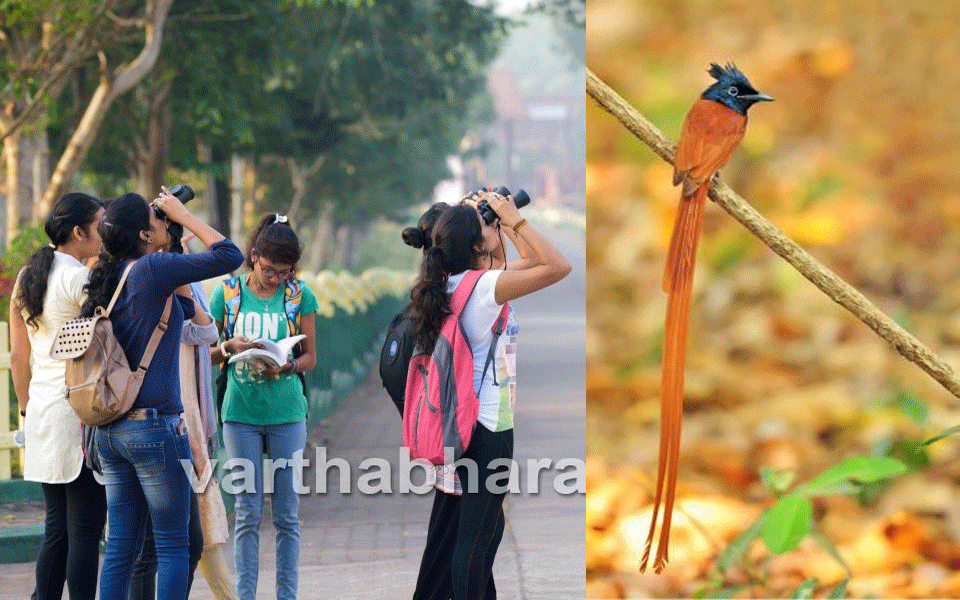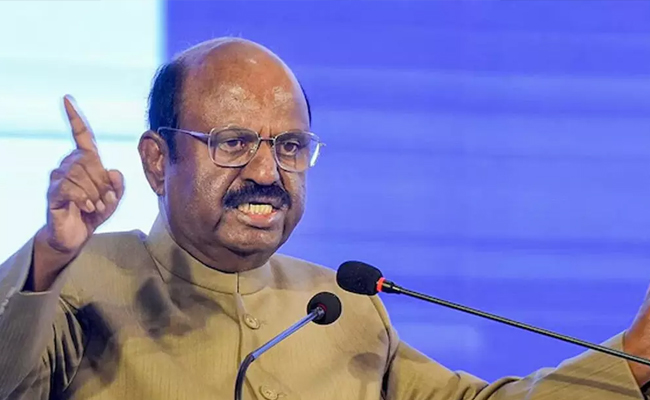Konaje: The Mangalore University has secured second position in the country In the Campus Bird Count (CBC), Mangalore University is among the top five bird-rich campuses and secured second position in the country, followed by Kerala Agricultural University.
Birders from Mangalore University were able to record 110 species of birds during the Campus Bird Counting (CBC), an initiative taken up under Great Backyard Bird Count of Bird Count India, during the three-day bird-counting exercise between February 16 and 19 at the university’s Mangalagangothri campus in Konaje near here.
The University topped the campuses in Karnataka in both species numbers and total checklists. This time, the event had over 50 participants.
This year, the CBC concluded with a record-breaking 110 bird species on Mangalore University campus. Some of the highlights are the Tickell's Leaf Warbler (probably the 2nd record for Coastal Karnataka), and winter migratory birds like Indian Pitta, Brown Shrike, Booted Eagle, Ashy Drongo, Blyth's Reed Warbler, Brown-breasted Flycatcher, Eurasian Blackbird, Gray wagtail and Blyth's Pipit and Srilankan Frogmouth.
The team was led by Vineeth Kumar K (research scholar), with Jagdish Paithankar (research scholar), Bhagya U J (MSc student) and Donald Preetam Henry (MSc student) of Department of Applied Zoology, Mangalore University.
The enthusiasts students and research scholars from various PG Departments “ Applied Zoology, Applied Botany, Biosciences, Chemistry, Commerce, Geoinformatics, Material science, Physics and Yogic Science – along with some staff of P A College of Engineering, Ambika Vidyalaya and Govinda Dasa College, students and research scholars from other institutions and some independent birdwatchers from Mangaluru had taken part.
The success of the event is mainly due to involvement of enthusiastic participants and also covering of more unexplored areas of the campus in this year's survey.
The CBC is a sub-event of the larger 'Great Backyard Bird Count' (GBBC), organised by the annual Bird Count India. This is a collaborative effort to document the bird-life in campuses across India, with information about the diversity, distribution and frequency of bird species outside the protected areas.
Let the Truth be known. If you read VB and like VB, please be a VB Supporter and Help us deliver the Truth to one and all.
Bengaluru (PTI): Leader of Opposition in the Karnataka Assembly R Ashoka on Thursday took a dig at CM Siddaramaiah ahead of the state Budget presentation, claiming that the government is expected to borrow Rs 1.15 lakh crore and is likely to impose fresh taxes on the people.
He said the Budget would have nothing new, adding that its highlights would be criticism of Prime Minister Narendra Modi and repeated mentions of the five guarantee schemes ('Shakti', 'Gruha Lakshmi', 'Gruha Jyoti, 'Yuva Nidhi' and 'Anna Bhagya').
Chief Minister Siddaramaiah, who also holds the Finance portfolio, is scheduled to present the 2026–27 Budget on March 6. This will be his record 17th budget.
“Siddaramaiah-led Congress government’s budget will be presented tomorrow. While Finance Minister Nirmala Sitharaman reduced the tax burden in the Union Budget, Siddaramaiah is known for imposing taxes on people. He imposes about four taxes a month and has already introduced 36 taxes, and is now looking for ways to impose more,” Ashoka said.
Speaking to reporters, he said the Congress had promised people before coming to power that the guarantee schemes would be implemented without imposing any burden on them.
“By the end of the chief minister’s term, the state’s total debt will probably exceed Rs 6 lakh crore. The government has already breached financial discipline. Siddaramaiah and his government are somehow managing the situation,” Ashoka claimed, adding that his borrowings as CM equal those of 12 or 13 former chief ministers combined.
Stating that the Budget should create higher revenue sources, ensure that no burden is placed on people, and take the state away from debt, the opposition leader said this could be ensured only by a “clever and intelligent finance minister.”
“Anyone can run a government by pushing the state into debt,” he said, accusing Siddaramaiah of “increasing the state’s debt and failing to meet the expectations of the people.”
Highlighting that Siddaramaiah blames the previous BJP government for everything, Ashoka said Basavaraj Bommai, the chief minister during the previous BJP government, had presented a “surplus budget,” without excessive borrowings.
“Despite having the opportunity to borrow more while staying within the parameters of financial discipline, he (Bommai) did not do so, as it would burden the people,” he said, accusing Siddaramaiah of borrowing crores of rupees every year.
“I feel that this time too, he will take a loan of Rs 1.15 lakh crore,” he claimed.
The BJP leader said he had written to the CM requesting an allocation of Rs 15,000 crore annually for the development of backward taluks, as recommended by the High Power Committee on Redressal of Regional Imbalance (HPCRRI), chaired by economist Prof M Govinda Rao.
Claiming that the government appears “inactive” due to internal rifts, Ashoka pointed to an ongoing power struggle between factions led by Siddaramaiah and Deputy Chief Minister D K Shivakumar over the CM’s post.
“Amid all this, we cannot expect anything new from this Budget. The CM will repeatedly speak about the guarantee schemes and target the central government and PM Modi. Criticising Modi and repeated mentions of the five guarantee schemes will be the highlight of this Budget. Other than that, there will be nothing new,” he added.
He also dismissed the CM's claim that the government had achieved 90 per cent of the promises made in the previous Budget. “The fact is that not even 9 per cent has been achieved. I have evidence for it,” he said.
Ashoka further alleged that the government had also failed in tax collection, achieving only 48 per cent of the target, and had released less than 40 per cent of the allocated funds to some departments.





